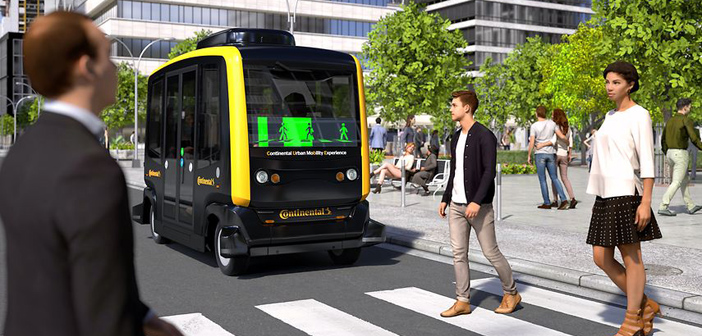Continental revealed a range of new products and innovations in the AV space at CES 2020. Among them is a holistic solution for human-machine interaction that Conti is developing specifically for autonomous vehicles.
The company believes that safety, accessibility, comfort and an immersive onboard experience will drive acceptance for autonomous shuttle buses or robotaxis, ultimately leading to their large-scale adoption. Continental’s holistic human-machine solution is designed to lay the foundation for this by providing an end-to-end experience for users, not only limited to booking a ride and transporting passengers to their destination.
The concept also helps them to plan the next course of their journey and provide relevant information about social events. Most importantly, Conti says, it will reassure passengers and pedestrians regarding their safety within and around the driverless vehicle and create opportunities for smart cities and service providers to make customized services available.
“With this approach, Continental is enabling an intuitive interaction between driverless vehicles, passengers and pedestrians,” said Karsten Michels, head of systems and technology at Continental’s Interior division. “We are establishing a continuous and natural dialog between people and vehicles, building user trust and delight, which is imperative for autonomous driving.”
In a separate development, Continental’s Argus Cyber Security subsidiary has joined forces with experts from T-Systems to present their first Automotive Security Operations Center (SOC). In this Automotive SOC, vehicle manufacturers and fleet operators can continuously monitor the IT security of their vehicles on the road, detect attacks and react as quickly as possible.
Also new is the Contact Sensor System (CoSSy), which detects contact between a vehicle and a person or object at cutting speed. Continental says that CoSSy helps to make applications like automated parking safer.
The recording of sound signals by CoSSy can be used to detect a collision impact at low speeds so that the vehicle can be stopped immediately. Once installed, the CoSSy sensor signals can support many other applications, such as the detection of vandalism (scratching), low-speed parking knocks, road-condition recognition, driver identification by voice and the detection of approaching emergency vehicles.
Meanwhile to reduce the effort required to integrate AV and other software into future vehicles and increase software quality, Continental has developed an online platform that automates and standardizes software development and integration in the vehicle.
The Continental Cooperation Portal automates the back-and-forth between software delivery, testing and validation, as well as restoring data for all software suppliers in the event of errors. This is said to ensure that only error-free applications are transferred to the actual development system. Up until that point, the online platform will reduce the need for correction loops and free up capacity for implementing other electronic control unit functions.


